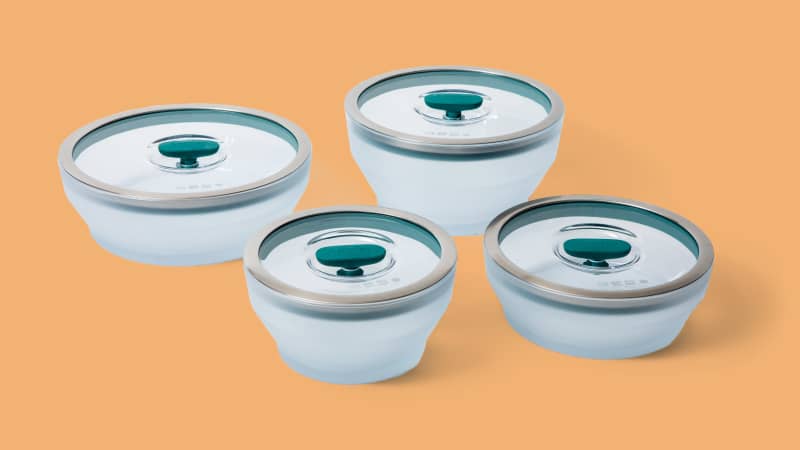The Best Pot Holders
Equipment Review
The new David Chang–backed brand claims that you can use its cookware to make entire meals in the microwave. We tested it to see if it lives up to the hype.
Published Dec. 6, 2021.

Launched in March 2021 by Stephanie Chen of the Meyer Corporation, a major cookware manufacturer, and in partnership with restaurateur David Chang, Anyday claims that you can use its dishes to cook entire meals in the microwave. We tested the cookware and were impressed; the glass dishes and lids were easy to use, and the food inside cooked evenly. We also like that the Anyday website provides not only free, delicious recipes but also solid support, allowing us to customize our experience by choosing our microwave wattage and serving size from drop-down menus.
Anyday wants to change the way we think about the microwave. The company claims that by using its cookware and recipes, home cooks can have perfectly cooked, delicious meals (think sticky Honey Mustard Chicken Wings, Sloppy Joes, Bok Choy with Peanut Sauce, and even Garlic Butter Lobster Tails), all made in the microwave with minimal effort.
The cookware is available in three colors and in four sizes (a large deep dish, a medium deep dish, a large shallow dish, and a medium shallow dish) that can be purchased individually, in pairs (large deep and large shallow or medium deep and medium shallow), or as a complete set of four. We tested all four dishes, sold together as The Everyday Set.
The dishes and lids are made of thick, frosted, shock-resistant borosilicate glass, which resists cracking when exposed to sudden shifts in temperature (e.g., taking a hot dish out of the microwave and putting it on a cold surface). Each lid has a silicone knob that pops up and doubles as a vent and a microwave-safe stainless-steel rim with a silicone gasket underneath to ensure a tight seal. The glass allows the microwave to cook the food through, and the lid captures the moisture released from the food as it cooks, preventing it from drying out.
We made eight Anyday recipes as well as our recipe for Microwaved Beets. (For comparison, we also cooked the microwaved beets and several of the Anyday recipes in similar-size bowls from our favorite glass mixing bowl set, the Pyrex Smart Essentials Mixing Bowl Set.)
A major perk of using the Anyday cookware set is the company’s free recipes. Each recipe was easily adjustable: Input the wattage of your microwave and the desired serving size, and the recipe automatically adjusts ingredient quantities and cooking times. Anyday also has simple, one-ingredient recipes for foods such as cooked broccoli, chicken breasts, and quinoa.
Of the eight Anyday recipes we tried, we were impressed by the perfectly cooked chicken wings and sloppy joes, al dente pasta, crisp-tender...

The mission of America’s Test Kitchen Reviews is to find the best equipment and ingredients for the home cook through rigorous, hands-on testing. We stand behind our winners so much that we even put our seal of approval on them.

This is a members' feature.